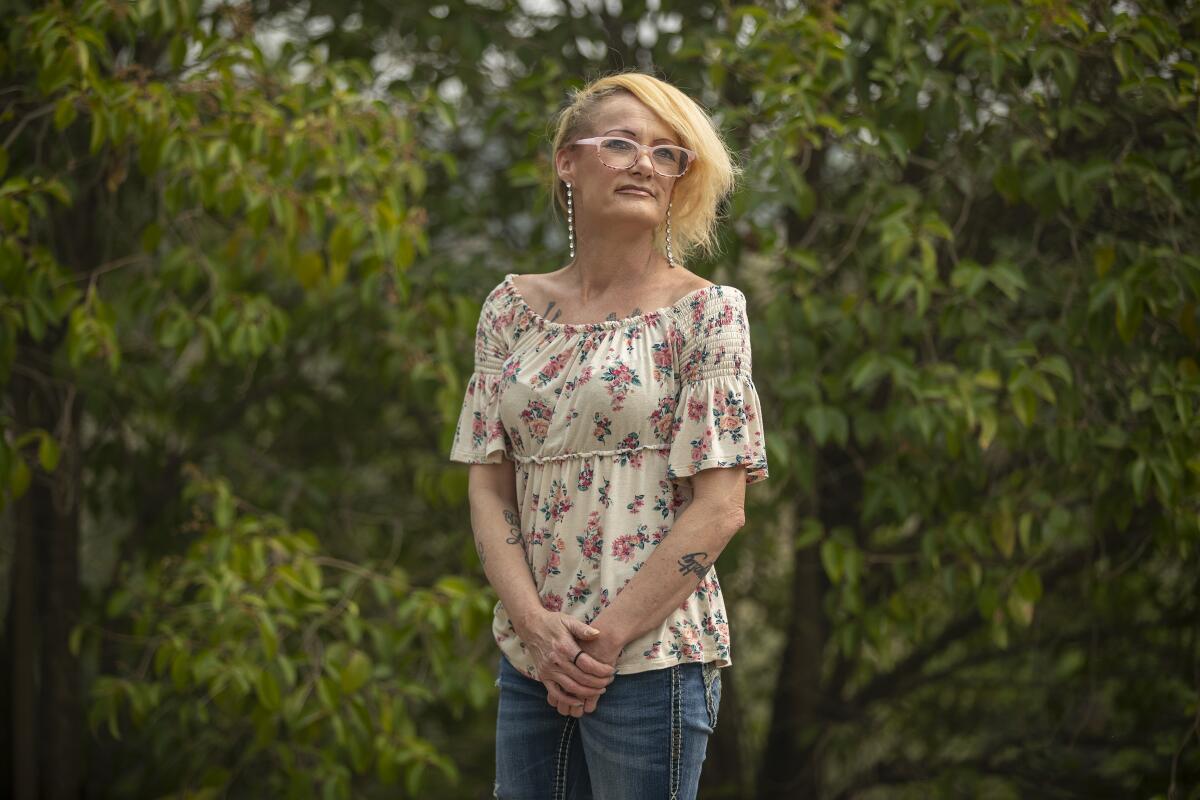She had to flee a fire while trying to free her daughter — a trafficking victim — from prison

- Share via
OROVILLE, Calif. — Tracey Aldrich and her mother Deborah were forced out of their rural Northern California homes by fire last Tuesday, but that’s not their biggest concern.
At night, before she falls asleep, Tracey Aldrich loses control of her thoughts, and they turn to her daughter Keiana, she said. She wonders how badly she is hurt, or if she is in pain, or even aware that anyone cares.
Nearly three weeks ago, Keiana Aldrich, 25, an inmate at the California Institution for Women, allegedly slashed her neck and wrists with razor blades then swallowed two of them. No one on the outside has spoken to her since and prison officials have denied her attorney a phone call.
Tuesday, prison officials declined to comment on Keiana Aldrich’s condition or why communication with her has been cut off.
“I try to keep myself busy so I don’t think, but then I have to think because she is my daughter,” said Aldrich from Oroville, where the North Complex fire continues to burn, and where she is staying at a cousin’s house while her own remains under threat. “I am just so tired all the time, so tired.”
Deborah Aldrich, 69, who lives in Berry Creek up the mountain about 10 miles from her daughter, fled just ahead of flames that destroyed the town and killed at least 15. The most senior Aldrich is now without a home for the foreseeable future as well, while crews attempt to control the blaze and ensure the area is safe.
It is, said Deborah Aldrich, “too much tragedy.”
How the Aldrich family came to this confluence of crises is a distinctly California story of race, poverty, fire and — they hope — redemption.
As part of our Column One story on Kevin Howard’s struggle to build a life beyond the battlefield, here is a list of organizations that provide support, information and resources to veterans and others.
Tracey Aldrich, 45, ran away from home as a teenager, she said, and by 14 was “eating out of garbage cans” in Oroville, a Northern California town of 20,000, founded after gold was discovered in its hills. Though she was raised in Thermalito, a town of about 7,000 on Oroville’s outskirts, her parents moved to a triple-wide trailer up a steep dirt road in Berry Creek about 25 years ago, she said.
By 18, she was pregnant with Keiana, her second child, by a Black minister nearly twice her age, she said. Tracey Aldrich, who is white, said her father was bigoted and having mixed-race children was intolerable to him.
“I was never raised that way, but he was,” said Deborah Aldrich of her late husband, who passed away six years ago, and whom she otherwise describes as a “good husband.”
“He was very prejudiced. That was the way he was raised,” she said. “It was really hard on me, and on Tracey, too. He didn’t want [Tracey’s children] in his house. It was redneck.”
Kieana Aldrich was 17 when sent to prison. Her mental health has deteriorated behind bars, but the coronavirus has cut off nearly all help.
Tracey Aldrich split with Keiana’s father, but when Keiana was about 5, he was charged with assaulting the child, Tracey Aldrich said. Keiana testified against him. Court records show he pleaded no contest to a battery case in 1998 and was sentenced to 120 days in jail. He went to prison a few years later for an unrelated felony count of a sexual act with a minor, according to Butte County Superior Court records, and served more than seven years before he was released in 2008.
Tracey Aldrich eventually made her way with her kids 70 miles south to Sacramento, where she found herself in a string of abusive relationships, she said. By the time Keiana was 12, the young girl began running away — behavior that made Tracey Aldrich angry then, but which she now sees as her daughter feeling “helpless” at seeing her mother being abused.
Often taken by police to juvenile hall, Keiana was returned to her mother with little intervention, said Peggy Fava, a counselor and sex trafficking victims advocate who first met Keiana when she was brought in after one of those police pickups.
In interviews earlier this year, Keiana said she was sexually exploited almost as soon as she began leaving home and at 16 was arrested in a prostitution sting in Sacramento. She testified against her female pimp, hoping prosecutors would help her find counseling and stable housing, she said — but that aid never materialized despite the pimp being convicted.
At 17, she was back on the streets and another female pimp was selling her through online advertisements. Responding to one of those ads were two men who wanted to make child pornography with Keiana, according to court documents. The pimp pulled a gun and Keiana helped her put one of the men in the trunk of a vehicle, the documents say. They took the man to a store and allegedly forced him to buy goods and give them money. The incident was caught on surveillance video.
Keiana was charged as an adult with false imprisonment and kidnapping, and accepted a plea deal in 2013 for nearly 10 years in prison.
Neither man was charged with attempting to purchase Keiana, as they intended to do when they answered the ad, according to Maggy Krell, a former state prosecutor who has taken Keiana’s case pro bono.
Krell points out that California law has changed in recent years, and sex trafficked minors like Keiana are now treated as victims, rather than willing participants in their sale.
A few years after Keiana went to prison, Tracey Aldrich began to rebuild a relationship with her mother after her father died, she said. Though it has been tentative steps, “I kind of forgave my dad,” she said, and is now living in Oroville just down the hill from Deborah Aldrich.
“Tracey’s been wonderful,” said her mom, who has lung problems and uses an oxygen tank. “When I need anything, I just call her.”
Last Tuesday, Tracey Aldrich was in her two-story house down a winding dirt road when Deborah Aldrich called to ask her to bring some groceries. Tracey Aldrich recalls her mother asking for beer. Deborah Aldrich said it was tuna and bread she was after.
PG&E had cut the power to her trailer the night before. In the deep dark of the forest, gusting winds kept Deborah Aldrich up all night, she said, and “everything was rolling around on my deck.”
Though they were aware that fires had started in the nearby national forest, there had been no indication they were growing close enough to be a danger, both women said.
“We knew it was smokey, but we didn’t know about [any] fires,” said Tracey Aldrich.
But after grabbing the groceries, Tracey found the road up the mountain blocked by law enforcement who told her there was a mandatory evacuation happening. Deborah Aldrich said she did not receive any evacuation notice on her cellphone, though local authorities said they sent them.
With the North Complex fire still flaring in Butte County, many wonder if this family’s lifeline to a community will rise from the ashes.
Fearing her mom wasn’t mobile enough to get out quickly, she asked sheriff’s deputies to check on her, then called to warn her she needed to leave.
“I just started throwing a few clothes in and my oxygen, medication,” Deborah Aldrich said. “I seen what happened in Paradise.”
The senior Aldrich had also been evacuated during the Camp fire in 2018, when a blaze about five ridges away destroyed that town, killing 85 people. Last week, she was halfway down her driveway when deputies arrived to take her to safety.
By then, hundreds of other people were coming down the narrow, two-lane highway, and uncontrolled fire was about to sweep down on Berry Creek. By nightfall, the town was nearly completely destroyed.
When the women found each other in the grocery store parking lot, “I just hugged her and she hugged me,” Tracey Aldrich said. If it hadn’t been for wanting that beer, “she wouldn’t have made it out.”
Before Tracey Aldrich could even return to her own home to gather some belongings, it was also put in an evacuation zone, and the women both found themselves temporarily homeless with few possessions — though Deborah Aldrich’s trailer was one of the few structures to survive the blaze, she recently learned, with the flames stopping just feet from her home.
“I was lucky,” she said. “Cal Fire said my defensive area was perfect. So what stopped it was probably that.”
Now, as they wait for evacuation orders to be lifted, they are anxious and frustrated that there is little word about Keiana.
Keiana applied to Gov. Gavin Newsom for clemency in July — which she hoped would cut the final eight months off her time. Tracey Aldrich said she emailed Newsom’s office to ask for help, but has not heard back. Krell, the lawyer, has asked a judge to intervene to force prison officials to allow her a phone call with Keiana, but has not received a decision. Tuesday night, she received word that Keiana was removed from suicide watch.
“I think it’s very unfair that they won’t let us talk to her, or at least let her mother talk to her,” said Deborah Aldrich. “Why not?”
Tracey Aldrich said she just wants her daughter home, and is holding out hope that she will be granted clemency.
“She deserves a second chance,” she said. “She deserves a chance, period. She never got one.”
If you or someone you know is exhibiting warning signs of suicide, seek help from a professional by calling the National Suicide Prevention Lifeline at (800) 273-TALK (8255).
More to Read
Sign up for Essential California
The most important California stories and recommendations in your inbox every morning.
You may occasionally receive promotional content from the Los Angeles Times.















![Vista, California-Apri 2, 2025-Hours after undergoing dental surgery a 9-year-old girl was found unresponsive in her home, officials are investigating what caused her death. On March 18, Silvanna Moreno was placed under anesthesia for a dental surgery at Dreamtime Dentistry, a dental facility that "strive[s] to be the premier office for sedation dentistry in Vitsa, CA. (Google Maps)](https://ca-times.brightspotcdn.com/dims4/default/07a58b2/2147483647/strip/true/crop/2016x1344+29+0/resize/840x560!/quality/75/?url=https%3A%2F%2Fcalifornia-times-brightspot.s3.amazonaws.com%2F78%2Ffd%2F9bbf9b62489fa209f9c67df2e472%2Fla-me-dreamtime-dentist-01.jpg)
